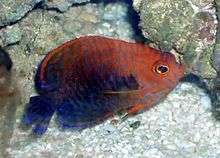Centropyge potteri
Centropyge potteri, commonly known as Potter's angelfish or the russet angelfish, is a marine angelfish from the Central Pacific Ocean. It is named in honor of Frederick A. Potter, the former director of the Waikiki Aquarium.
| Potter's angelfish | |
|---|---|
 | |
| Scientific classification | |
| Kingdom: | Animalia |
| Phylum: | Chordata |
| Class: | Actinopterygii |
| Order: | Perciformes |
| Family: | Pomacanthidae |
| Genus: | Centropyge |
| Species: | C. potteri |
| Binomial name | |
| Centropyge potteri (Jordan & Metz, 1912) | |
Description
Potter's angelfish grows to a size of 10 cm (4 in) in length. The fish is orange in color, with the bottom rear part of the fish being dark blue in color. The fish is covered with irregular, close-set, thin, vertical blue stripes. There have been reports of this angelfish with a unique morphology, whereas the most common coloration includes orange, in these individual(s) varying shades of blue replace all of the orange.[3] (See "In The Aquarium section for more details) These fish inhabit rocky ledges, where they are found feeding on algae and detritus. This species is essentially hermaphrodite and generally has a dominant male with a harem of females in the wild.
Distribution and habitat
This fish is native to the Johnston Atoll and the Hawaiian Islands in the central Pacific Ocean. Its depth range is 10 to 138 m (33 to 453 ft). It is a bentho-pelagic species and its typical habitat is rock, coral and rubble areas of exposed reefs.[2]
Status
Potter's angelfish has a wide range and is a common reef fish. Collection for the aquarium trade is not excessive and its numbers seem stable so the IUCN lists it as being of "Least Concern".[1]
In the aquarium
Potter's angelfish is generally reef compatible, however, like most dwarf angelfish, it has been known to nip at the polyps of stony corals. It will usually accept a varied diet of live food, frozen foods, meaty items, flake food and plenty of algae. However, some specimens may be very difficult to feed in an aquarium. Potter's angelfish are best kept on their own or in pairs because they will fight with others of their own kind. This fish is peaceful and is generally only aggressive to similar species and its own kind.
These brightly colored fish are usually very difficult to keep due to their complex dietary and environmental requirements.
While the orange and blue coloration mentioned above is by far the most commonly found in Aquaria, two of the rare blue color morphs were recently discovered off the coast of Kona, Hawaii at depths of 60 meters. After being collected they were sold, with one going to Kyoto, Japan (where rare marine animals are highly sought after, and will usually fetch a much higher price) for a reported ¥600,000(~$5000).[3]
References
- Pyle, R.; Myers, R. (2010). "Centropyge potteri". IUCN Red List of Threatened Species. 2010: e.T165899A6160601. doi:10.2305/IUCN.UK.2010-4.RLTS.T165899A6160601.en.
- "Centropyge potteri (Jordan & Metz, 1912): Russet angelfish". FishBase. Retrieved 2013-12-26.
3. Tanaka, Hiroyuki "Centropyge potteri - A Blue-black Color Morph from the Kona coast"http://reefkeeping.com/issues/2006-10/ht/index.php
- Reef keeping potteri
| Wikimedia Commons has media related to Centropyge potteri. |
| Wikispecies has information related to Centropyge potteri |
